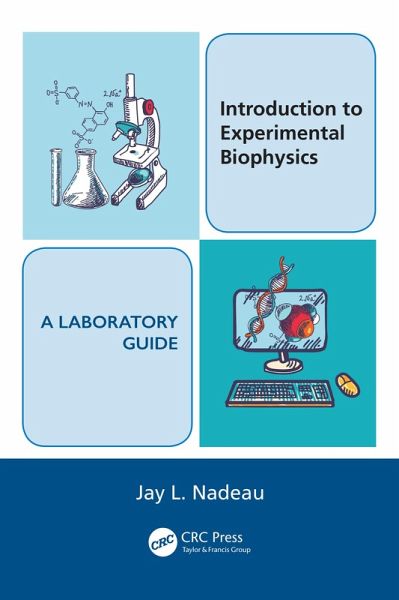
Introduction to Experimental Biophysics - A Laboratory Guide (eBook, PDF)
Versandkostenfrei!
Sofort per Download lieferbar
119,95 €
inkl. MwSt.
Weitere Ausgaben:

PAYBACK Punkte
60 °P sammeln!
Easily Get Started with Biological ExperimentsIntroduction to Experimental Biophysics - A Laboratory Guide presents wet lab methods for courses in biophysics or molecular biology. A companion to the author's highly praised An Introduction to Experimental Biophysics: Biological Methods for Physical Scientists, this manual offers a flexible course plan that permits completion of the labs in either a full term or intensive summer course.Tested in a pedagogical setting, the experiments follow a logical progression beginning with a DNA construct. The book starts with the basics of molecular cloning...
Easily Get Started with Biological Experiments
Introduction to Experimental Biophysics - A Laboratory Guide presents wet lab methods for courses in biophysics or molecular biology. A companion to the author's highly praised An Introduction to Experimental Biophysics: Biological Methods for Physical Scientists, this manual offers a flexible course plan that permits completion of the labs in either a full term or intensive summer course.
Tested in a pedagogical setting, the experiments follow a logical progression beginning with a DNA construct. The book starts with the basics of molecular cloning: amplifying and purifying plasmid, plasmid mapping, and using restriction enzymes. Later experiments deal with more advanced, emerging techniques, such as the synthesis and characterization of quantum dots and gold nanoparticles, protein crystallization, and spectroscopic techniques.
This accessible guide will help both students and instructors in molecular biology, biophysics, and biomedical engineering. Students will understand how to use a variety of techniques in biological experiments while instructors will get practical guidance on preparing the experiments.
Introduction to Experimental Biophysics - A Laboratory Guide presents wet lab methods for courses in biophysics or molecular biology. A companion to the author's highly praised An Introduction to Experimental Biophysics: Biological Methods for Physical Scientists, this manual offers a flexible course plan that permits completion of the labs in either a full term or intensive summer course.
Tested in a pedagogical setting, the experiments follow a logical progression beginning with a DNA construct. The book starts with the basics of molecular cloning: amplifying and purifying plasmid, plasmid mapping, and using restriction enzymes. Later experiments deal with more advanced, emerging techniques, such as the synthesis and characterization of quantum dots and gold nanoparticles, protein crystallization, and spectroscopic techniques.
This accessible guide will help both students and instructors in molecular biology, biophysics, and biomedical engineering. Students will understand how to use a variety of techniques in biological experiments while instructors will get practical guidance on preparing the experiments.
Dieser Download kann aus rechtlichen Gründen nur mit Rechnungsadresse in A, B, BG, CY, CZ, D, DK, EW, E, FIN, F, GR, HR, H, IRL, I, LT, L, LR, M, NL, PL, P, R, S, SLO, SK ausgeliefert werden.



